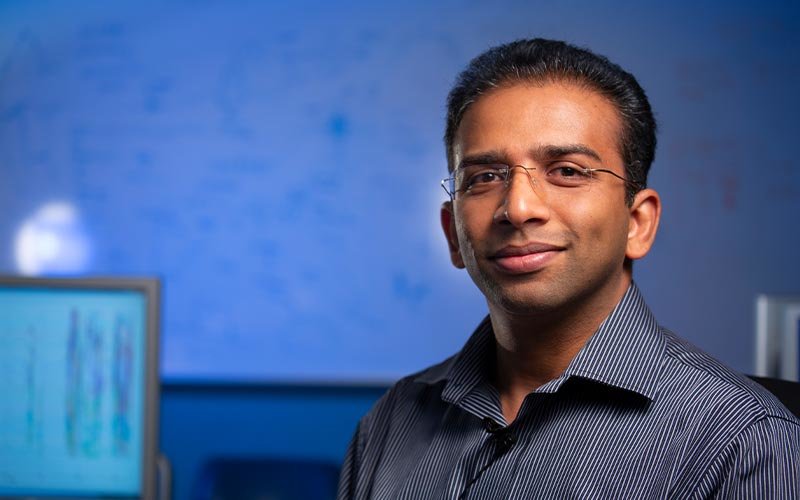
Computer engineering professor Kiran George is a research pioneer and a model faculty member whose dynamic and inspiring teaching style has helped countless students reach their academic and career goals.
Since fall 2007, when George became a faculty member in the College of Engineering and Computer Science, he has continuously demonstrated the highest form of excellence in teaching, scholarly activities and service.
For his innovative and prolific research endeavors, track record of leadership and commitment to teaching, George is this year’s recipient of Cal State Fullerton’s Outstanding Professor Award. CSUF President Fram Virjee announced George’s selection for the award at today’s virtual Academic Senate meeting.
The award is given to a faculty member for outstanding teaching, distinction in scholarship and/or creative activities, and contributions to the university and California State University system.
“Dr. George is a selfless and kind individual who constantly thinks about student learning and success before anything else,” said Susamma (Susan) Barua, the college’s dean.
George’s research interests include developing low-cost assistive technology devices, the “internet of things” and high-performance computing. His contributions to the fields of brain-computer interface technology — systems that use signals from the brain to enable communication, such as in individuals with impaired function — biomedical engineering research and wideband digital receivers have received wide recognition within and outside of the university.
“His hands-on approach in innovative interdisciplinary engineering projects has always generated a long line of students eager to join his lab,” Barua added. “He has methodically implemented high-impact practices and student success activities in his own laboratory and in his classroom.”
George, who earned a doctorate from Wright State University in Dayton, Ohio, directs the college’s Bio-Electric Signal-Based Systems Laboratory. The lab’s primary focus is to design and develop affordable user-friendly assistive technology devices that require minimal training to operate. He collaborates with support organizations and institutions, including the ALS (amyotrophic lateral sclerosis) Association.
The recipient of the university’s 2017 L. Donald Shields Excellence in Scholarship and Creativity Award, George has received more than $2.7 million in grants and awards, including funding from the National Science Foundation and U.S. Army Research Labs for his research. In 2012, he was the recipient of a prestigious National Science Foundation Faculty Early Career Development (CAREER) award.
George also is the recipient of foundation grants to carry out technology-driven research activities funded by such companies as Mercury Defense Systems, and Cisco Systems Inc. — through the Silicon Valley Community Foundation — that supports the internet of things curriculum and student projects. George also led a $600,000 National Science Foundation grant for the Academic Catalyst for Excellence program, which targeted academically promising, but economically disadvantaged students.
During his academic career, he has authored or co-authored more than 85 peer-reviewed technical articles and reports, with many of his students co-authors.
Since 2014, George has served as coordinator of the Computer Engineering Program, which has seen a surge of growth under his leadership and where students call him approachable, supportive and caring. He believes that teaching is a dynamic process that requires constant improvement, self-assessment and great dedication, and is always trying new approaches and effective ways to guide and challenge students to achieve their full potential, his colleagues pointed out.
His former student Krupal Mistry, now a software engineer who earned a master’s degree in computer engineering in 2018, recalled his first technical course with George, the “Introduction to Digital VLSI Logic Design and Computer Organization.”
“Dr. George’s profound and thorough knowledge about the subject helped me increase my curiosity and get a deeper understanding of concepts,” said Mistry, adding that under George’s mentorship, he also sharpened his interpersonal, coding and analytical skills.
“His teaching methodology had a perfect blend of theoretical and practical aspects, which helped to increase my passion for engineering and refine my problem-solving skills.”
What sets George apart, his colleagues agreed, is his involvement of students in many leading-edge research projects. Students are able to relate the theoretical concepts they learn as part of their coursework and directly apply them to real-world scenarios. He collaborates with undergraduates and graduate students on capstone computer engineering design projects to prepare them for the workforce.
“His enthusiasm and passion towards developing new technology motivated me to perform better in the lab and successfully complete my thesis,” said Neha Jayaprakash, his former student.
Jayaprakash’s research experiences with George, which included developing an autonomous wheelchair, spurred her growth as an engineer and helped her land a career position after graduating in 2018 with a master’s degree in computer engineering.
“Without his support it would be impossible to stand out among the many applicants,” said Jayaprakash, a component design engineer at Intel Corp. “I would not have the cutting-edge career I have today. I hope he continues to provide opportunities to many more students like me.”
Contact: Debra Cano Ramos, dcanoramos@fullerton.edu